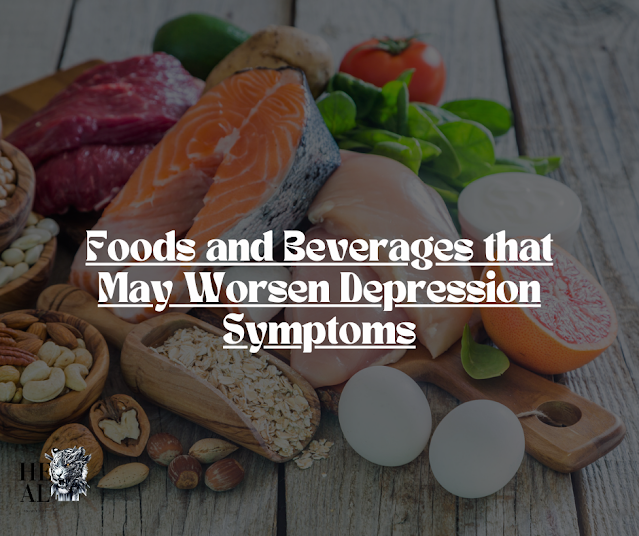Foods and Beverages that May Worsen Depression Symptoms
Certain foods and drinks that could exacerbate depressive symptoms can significantly impact mental health. While talk therapy and medication are the primary treatments for depression, self-care strategies, including dietary adjustments, can also be beneficial.
 |
| Foods and Beverages that May Worsen Depression |
- Fast food is often cheap, convenient, and palatable, but it can increase inflammation in the body due to ingredients like artificial trans fats, refined carbohydrates, sodium, and sugar. Studies have shown that regular consumption of fast food is associated with a 40% higher risk of developing depression. Instead, consider healthier options like salads or wraps.
Alcohol
While a glass of wine might temporarily lift your spirits, excessive alcohol consumption can lead to increased symptoms of depression and interfere with antidepressant medications. Consider alcohol-free alternatives such as mocktails or 0% beer.Refined Grains
Refined grains, such as white rice and white bread, lose much of their nutritional value during processing. Research indicates that unrefined grains are associated with a lower risk of depression. Opt for whole grains like brown rice or whole-wheat bread instead.Salt
Excessive salt intake can lead to increased inflammation in the body, negatively affecting the gut microbiome and brain blood flow, which may contribute to depression. While salt is necessary for bodily functions, it’s wise to reduce added salt in your diet.Refined Sugar
High intake of refined sugar is linked to numerous health issues, including an increased risk of depression. It can elevate inflammation levels, disrupt hormonal balance, and affect neurotransmitter levels. Seek lower-sugar options and carefully check ingredient lists to avoid high-sugar products.Artificial Sweeteners
Often used as sugar substitutes, artificial sweeteners can also contribute to depressive symptoms. Studies suggest that sweeteners like aspartame may alter brain chemical balance and increase stress hormone levels. Consider unrefined sugar alternatives like honey or stevia, but use them in moderation.Energy Drinks
High in caffeine and sugar, energy drinks can exacerbate stress and depressive symptoms. Instead, opt for natural energy boosters such as green tea or dark chocolate.Processed Meat
Processed meats like sausages, ham, and jerky are linked to higher inflammation levels, which can elevate the risk of depression. Choose healthier alternatives such as grilled chicken, turkey, tuna, avocado, or eggs for sandwiches.
When to Seek Help
While dietary changes can alleviate some depression symptoms, they should not replace traditional treatment methods like therapy and medication. If you’re struggling with depression, it’s crucial to seek professional help and adhere to a comprehensive treatment plan.
Incorporating a balanced diet rich in whole foods while avoiding the aforementioned foods and beverages that may worsen symptoms of depression can contribute to improved mental well-being. Small changes in your diet can lead to significant benefits for your emotional health.
